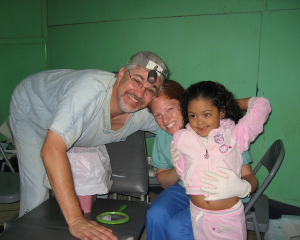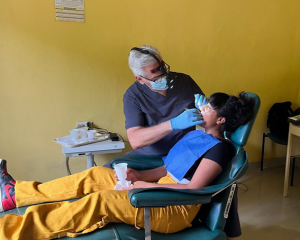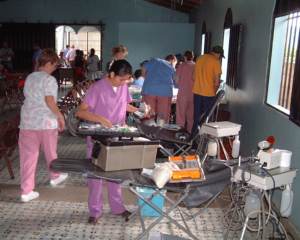Providing Critical Care and Support to Honduras Through Medical Brigades
 My mission experience started through my local church, Living Grace Community Church, in Cary, Illinois. At the time, we had been partnering with World Gospel Outreach (WGO) since the early 1990s. WGO is an organization based in Tegucigalpa, Honduras, and its mission is to reach the world with the Christian gospel through medical brigades, starting in Honduras. Honduras is the poorest country in Central America. Anyone partnering with WGO can lead a mission team of 15–30 people. In 2006, I went on my first trip, lead by our pastor, along with one of my hygienists. Since then, I have been back five times.
My mission experience started through my local church, Living Grace Community Church, in Cary, Illinois. At the time, we had been partnering with World Gospel Outreach (WGO) since the early 1990s. WGO is an organization based in Tegucigalpa, Honduras, and its mission is to reach the world with the Christian gospel through medical brigades, starting in Honduras. Honduras is the poorest country in Central America. Anyone partnering with WGO can lead a mission team of 15–30 people. In 2006, I went on my first trip, lead by our pastor, along with one of my hygienists. Since then, I have been back five times.The WGO missions are fairly labor-intensive. We stay in a nice mission house in the surrounding hills of Tegucigalpa. After a cultural assimilation briefing on Sunday, we get up early Monday and load a panel truck with all of the supplies and equipment needed for medical, dental, optometry and pharmacy care, as well as a spiritual brigade, and then drive up to two hours to a local church in an area of need within Tegucigalpa. The church must have enough open area to set up a makeshift clinic. The neighborhood will have been canvassed previously in order to tell people of the clinic. As soon as we set up, the doors open, and 300–500 people will be seen in two days. After the second day, we break everything down and return everything to the mission house. On Wednesday, we brief and either have an opportunity to visit an orphanage that WGO operates or take a short tour of some of the local sights. On Thursday and Friday, we operate another clinic at a different location. On Saturday, we go home.
 WGO can be clinically challenging in that the equipment is all portable and often makeshift. There is no radiography equipment and very little provisions to do root canal therapy, unless you can bring your own supplies and work very fast under the conditions. Consequently, many teeth are extracted that could have been otherwise saved. Without radiographs and decent suction, extractions can often be difficult.
WGO can be clinically challenging in that the equipment is all portable and often makeshift. There is no radiography equipment and very little provisions to do root canal therapy, unless you can bring your own supplies and work very fast under the conditions. Consequently, many teeth are extracted that could have been otherwise saved. Without radiographs and decent suction, extractions can often be difficult. I have also been to the El Ayudante mission in the foothills outside of Comayagua, Honduras. El Ayudante is a 21-acre compound that has a medical, dental and optometry clinic in a modern 5,000-square-foot building. Along with the clinic, staff interacts with the regional area by offering after-school study programs for all grades; educational programs for adults about parenting, hygiene and marriage; and various religious programs. They have provided much-needed water filters for the entire area and are now reaching up into the mountain community with filters and a portable medical/dental clinic.
 At the main clinic, people come from an area about the size of greater Chicago. The dentistry there is more modern, with real operatories and radiography equipment. There are now three full-time Honduran dentists on staff who are very eager to learn from visiting dentists. Although the clinic setting at El Ayudante is more modern, the equipment is old, and supplies can be limited. Everything is donated, and, as with WGO, you have to use what they have.
At the main clinic, people come from an area about the size of greater Chicago. The dentistry there is more modern, with real operatories and radiography equipment. There are now three full-time Honduran dentists on staff who are very eager to learn from visiting dentists. Although the clinic setting at El Ayudante is more modern, the equipment is old, and supplies can be limited. Everything is donated, and, as with WGO, you have to use what they have. Traveling through customs can be tricky. The supplies you bring are often examined, leaving you at the airport for several hours while authorities figure out how to tax you. On our last trip, we waited four hours while they came up with an equivalent of $55 U.S. dollars for a duffel bag full of vitamins.
In general, the experience is very rewarding. Most participants feel like they get more than they put in. The satisfaction of helping a population in need lends itself for much personal introspection and purpose. I highly recommend anyone participate in learning firsthand how some of the rest of the world lives.
